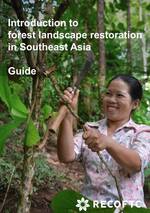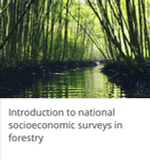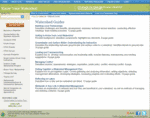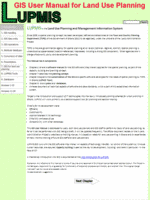Tools
A tool is a resource that supports and guides the implementation of SFM. This section includes all the tools available in the SFM Toolbox, which can be in form of publications, e-learning videos, software etc.
You can browse the Tools through keywords in the free search box or you can narrow the search using the filters on the right side of the page.
Degradation of forests and landscapes impacts the global climate, and also the food security and livelihoods of communities. Forest and landscape restoration (FLR) is a process which brings stakeholders together to create healthy, resilient and productive landscapes and meet national, regional and global commitments. This course has been developed to...
This guide is for forestry practitioners from local communities, governments, the private sector, civil society and academia in Southeast Asia. It explains the fundamentals of forest landscape restoration (FLR) and serves as a starting point for future exploration and design of FLR initiatives.
FLR is a process that people, governments...
The e-learning on the ‘National socioeconomic surveys in forestry’ comprises four courses that aim to provide guidance on the use of forestry modules to collect data on the socioeconomic contributions of forests and non-forests environments to household welfare and livelihoods. This course presents the background and relevance of forest-related questions...
This guide provides basic information needed to help you become technically proficient in the proper planning and use of prescribed fire. A glossary toward the end of this manual will help with unfamiliar terms. To learn more about the subject of prescribed fire, a list of suggested readings follows the...
This course covers the general aspects of sampling in forest inventories and aims to introduce the basic concepts and characteristics of a sampling study, as well as provide an overview of the most important components of a national forest inventory (NFI).
This course is primarily intended for people who are involved...
The course introduces the main concepts and principles of the Voluntary Guidelines on the Responsible Governance of Tenure. It aims to help people understand the Guidelines and to apply the principles to practical situations in their countries, as well as to raise the general awareness of responsible governance of tenure...
The toolkit was designed and partially drafted at an international workshop held in Kuala Lumpur, 22-27 March 1999, in conjunction with the GISP Early Warning component. The toolkit is intended to be global in its applicability, although there is a small island focus, recognizing that the impact of invasive alien...
The Conservation Technology Information Center (CTIC) is a national, public-private partnership that envisions agriculture using environmentally beneficial and economically viable natural resource systems.
CTIC, a nonprofit 501(c)(3) organization, is comprised of members of ag industry, ag publications, ag associations, conservation organizations and producers and is supported by the U.S. Environmental Protection...
This toolkit has been developed by the ICT-KM Program, a former Program of the CGIAR, the Food and Agriculture Organization of the United Nations (FAO) and the United Nations Children's Fund (UNICEF). It is a living knowledge repository about knowledge sharing. It was created to be a resource both for...
Since 2008, a spatial planning concept has been developed, defined and established at the Town and Country Planning Department (TCPD) of the Government of Ghana (2012 to be legalized), under the umbrella of the Land Administration Project.
TCPD is the sole governmental agency for spatial planning at all levels (national,...










